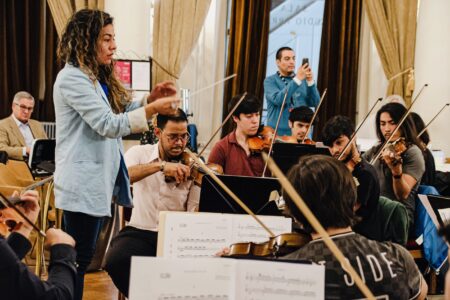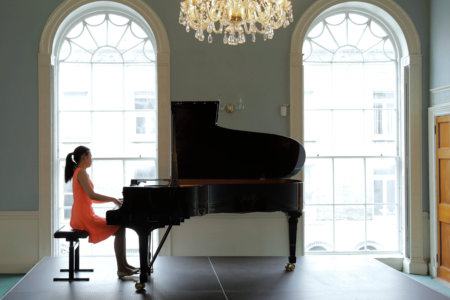
What does it take to become an actor, dancer, theatre director, or writer in 2024? The answer has remained the same for years: a good performing arts degree.
It’s how you hone your skills, build a solid foundation, and open doors to career opportunities. The good news is the best degrees today have gotten more well-rounded, featuring curricula that combine acting techniques, dance styles, directing principles, and scriptwriting.
Alongside multidisciplinary exposure, perhaps the greatest takeaway is all the practical know-how you’ll gain from working with seasoned instructors and your peers on various projects. Pair that with state-of-the-art facilities, and you’ll have a solid opportunity to develop your craft professionally. Then there are the performances, workshops, and internships too, which can further pad your resume and prepare you for a career in the performing arts.
Interested? Here are some top institutions offering exceptional programmes in the arts:

World-leading conservatoire London Academy of Music & Dramatic Art provides vocational training for successful careers in acting, directing, musical theatre, stage management and technical theatre production. Source: London Academy of Music & Dramatic Art
London Academy of Music & Dramatic Art
What do Benedict Cumberbatch, Ruth Wilson, and David Oyelowo have in common? They all honed their craft at the London Academy of Music & Dramatic Art (LAMDA), a pioneering drama school shaping the future of performing arts for over 160 years.
Here, training isn’t theoretical. It’s a full-on immersion. Expect hands-on experience, industry placements, and stage productions that bring your talents to life. Whether you crave the spotlight or the magic behind the scenes, LAMDA has a programme tailored for you.
The academy’s programmes are diverse and comprehensive. The BA in Production & Technical Arts focuses on modules such as scenic construction, lighting, sound and virtual production, preparing students for careers in film, theatre and live events. MFA Professional Acting students gain invaluable experience performing in public productions and acting in a professionally produced short film during their final year. MA/MFA Musical Theatre students showcase their talents at the Edinburgh Fringe Festival. For those in the MA/MFA Classical Acting programme, their intensive year culminates in a Shakespeare production attended by agents and casting directors, a golden opportunity that’s launched many careers.
These programmes take place in facilities that are second to none. With three theatres, an audio studio, and 16 versatile rehearsal spaces, students have everything they need to thrive. The 2023 addition of state-of-the-art virtual production and motion capture studios positions LAMDA at the forefront of drama education, offering training in cutting-edge technologies.
“This ensures our students emerge from training being ‘set ready’ in a range of technologies, and technicians enter the work arena with the right skills, knowledge, and experience to meet future demand,” says Principal and Chief Executive of LAMDA, Professor Mark O’Thomas.
Indeed, LAMDA graduates have made their mark in film, TV, theatre, live events, and radio. They have become actors, directors, playwrights, producers, and theatre practitioners, gracing the stage from the West End to Broadway and starring in productions on the BBC, Netflix, HBO and Apple TV+. Learn more about London Academy of Music & Dramatic Art.

Arts University Plymouth is the top arts university in the UK for overall student satisfaction, according to the National Student Survey (NSS) 2022 and 2023. Source: Arts University Plymouth
Arts University Plymouth
“Creative Education For A Changing World” — that’s what Arts University Plymouth, UK’s newest specialist Arts University, offers. What started as a drawing school in 1856 is now a catalyst for individual, societal, and ecological transformation in the 21st century.
Arts University Plymouth’s pre-degree, bachelor’s, and master’s programmes are innovative and distinctive. From Crafts & Making to Fashion & Textiles, all BA (Hons) degrees examine the interconnectedness of the arts and society, exploring distinct disciplines, expanded fields of study, and the spaces emerging between, across and beyond. From day one, you’ll learn by doing, with high levels of contact time and studio access, not just a few timetabled hours a week. You’ll have constant access to the facilities, technicians and tuition that you need to develop. It’s an approach that works — graduates go on to direct music videos for Dua Lipa, pitch fashions for ASOS, design games for Playstation and shoot photography for The Guardian.
At the postgraduate level, you’ll be part of an active, cross-disciplinary community of makers and thinkers. As an MA Fine Art student, you’ll benefit from the deep expertise and rich insights of this group in tutorials, lectures, subject-specific seminars, studio and gallery visits and group critiques. It helps that the university has abundant resources and workshops that are crucial for collaboration, such as Plymouth Arts Cinema, 3D Wood and Plastics workshop, Material Lab, and industry-standard Animation and Games studios, to name a few.
Whichever programme you choose, you’re set to pursue careers as practising artists, teachers, curators, and as gallery, theatre and technical professionals.

With over 900 students from more than 60 countries, the Royal Northern College of Music offers exceptional education, preparing musicians for careers on and off stage. Source: Royal Northern College of Music/Facebook
Royal Northern College of Music
Passion and conviction — these traits characterise students who attend the Royal Northern College of Music (RNCM). First established in 1973, the RNCM acts as a conservatory for music thinkers and performers eager to expand their art. It’s a space where music comes alive — inviting everyone, regardless of where they come from, to hone in on their talent and bask in the thrill of pursuing what they love.
Take the RNCM’s Undergraduate School, for example. Here, all forms of music are studied and celebrated, from classical forms to popular, current sounds. This includes an innovative Bachelor of Music with Honours in Popular Music, the UK’s first four-year degree of its kind. It’s a programme that continually reinvents itself, preparing its students to respond to the changes of a fast-paced music industry.
The RNCM Graduate School is just as impactful. Choose from conducting, performance, composition, music education and more — each programme is designed to be highly flexible and ripe with the real-world experience to set forth into the music industry. The Master of Performance, for example, provides various solo and ensemble performance opportunities and opportunities for industry placements.
Students learn and perform in a thriving UK live music hub, complete with a fully-equipped concert hall and theatre. They collaborate with orchestras and ensembles worldwide that have established longstanding partnerships with the RNCM. It’s an ideal starting point for musicians aiming to make their mark on the wider world.
*Some of the institutions feature in this article are commercial partners of Study International










